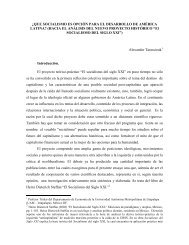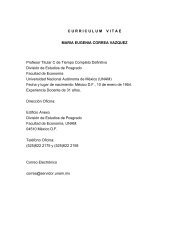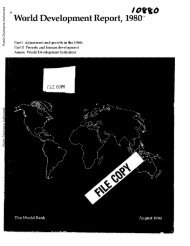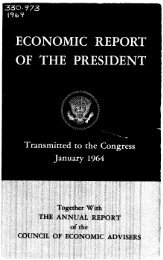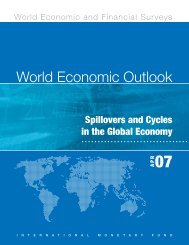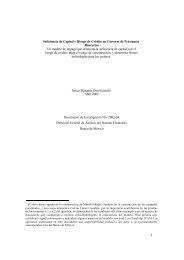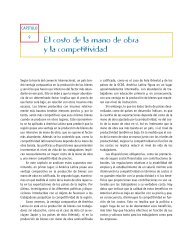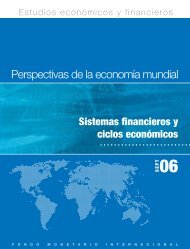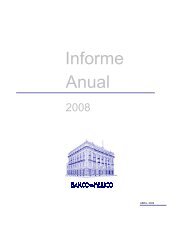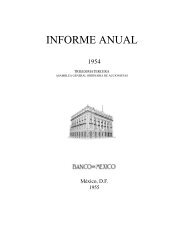World Bank Document
World Bank Document
World Bank Document
You also want an ePaper? Increase the reach of your titles
YUMPU automatically turns print PDFs into web optimized ePapers that Google loves.
5 Managing foreign finance<br />
The previous chapter showed that sound eco- what is the appropriate composition of capital<br />
nomic policies can raise the expected return from inflows and debt?<br />
international borrowing. Furthermore, with adaptable<br />
policymaking and flexible economic struc- Managing the level of capital inflows<br />
tures, countries can also reduce the risks involved<br />
in foreign borrowing. This chapter switches the In a world where all decisions were made by marfocus<br />
from the policies that determine the level ket forces alone, governments would not be<br />
and effectiveness of capital inflows to the manage- involved in deciding how much their countries<br />
ment of the inflows themselves. By the manage- should borrow from abroad. In reality, they are<br />
ment of capital flows we refer to the technical and involved-for two main reasons. First, in most<br />
institutional aspects of organizing the external lia- countries the public sector itself is the largest borbilities<br />
and assets of the nation; its purpose is to rower. Second, the set of prices facing private compick<br />
the best possible combination of risk and panies may be distorted by government policies,<br />
return consistent with the supply conditions in so the private sector may be encouraged to borrow<br />
capital surplus countries.<br />
too much or too little. While private companies can<br />
Effective management of foreign capital is not a be expected to try to ensure that their investments<br />
substitute for sound macroeconomic management; will generate enough domestic currency to repay a<br />
it is an essential part of it. Lending and borrowing loan, the availability of enough foreign exchange is<br />
decisions cannot be made independently of macro- the responsibility of the monetary authorities.<br />
economic policies. Debt managers need a clear<br />
understanding of expected macroeconomic devel- How much borrowing?<br />
opments, while policymakers must have a good<br />
grasp of expected new borrowing requirements Each individual loan must be justified on its own<br />
and debt service payments. Although these princi- merits. But experience suggests that it is also necples<br />
seem obvious, many countries suffer from a essary to pay attention to the aggregate level of<br />
lack of communication between debt managers inflows and debt. The sustainable rate of borrow-<br />
(usually in the Ministry of Finance), reserves man- ing depends on the rate of growth of a nation's<br />
agers (usually in the central bank), and macroeco- income and more particularly its exports. As long<br />
nomic planners (often in the Ministry of Planning). as income is growing faster than the rate of interest<br />
Governments have often treated the level of capi- over the long run, the country is solvent. To minital<br />
inflows as a residual and have framed their fis- mize the likelihood of liquidity problems, it is neccal<br />
and monetary policies independently of their essary for the rate of growth of exports to exceed<br />
effect on the level and structure of debt. A recent the rate of interest-that will ensure that the prostudy<br />
of twenty countries by the IMF found that portion of export revenues required to service the<br />
only one-fifth of developing countries were explic- debt will not continually rise (see Box 4.4).<br />
itly managing their debt systematically. Several A number of rules of thumb have been sugcountries<br />
are now arranging to bring debt manage- gested for managing the overall level of indebtedment<br />
into the mainstream of economic decision- ness-such as the need to limit the total debt sermaking.<br />
vice ratio to 20 percent-but caution must be<br />
This chapter discusses two sets of issues. First, exercised. No simple rule is adequate in all circumto<br />
what extent should governments seek to regu- stances. A country's ability to sustain any particulate<br />
inflows of foreign capital, beyond ensuring lar debt ratio depends on a number of factors<br />
that their economic policies are sound? Second, including the outlook for the country's exports,<br />
71




